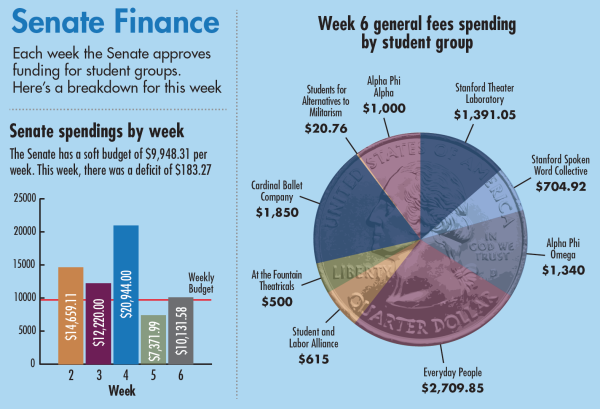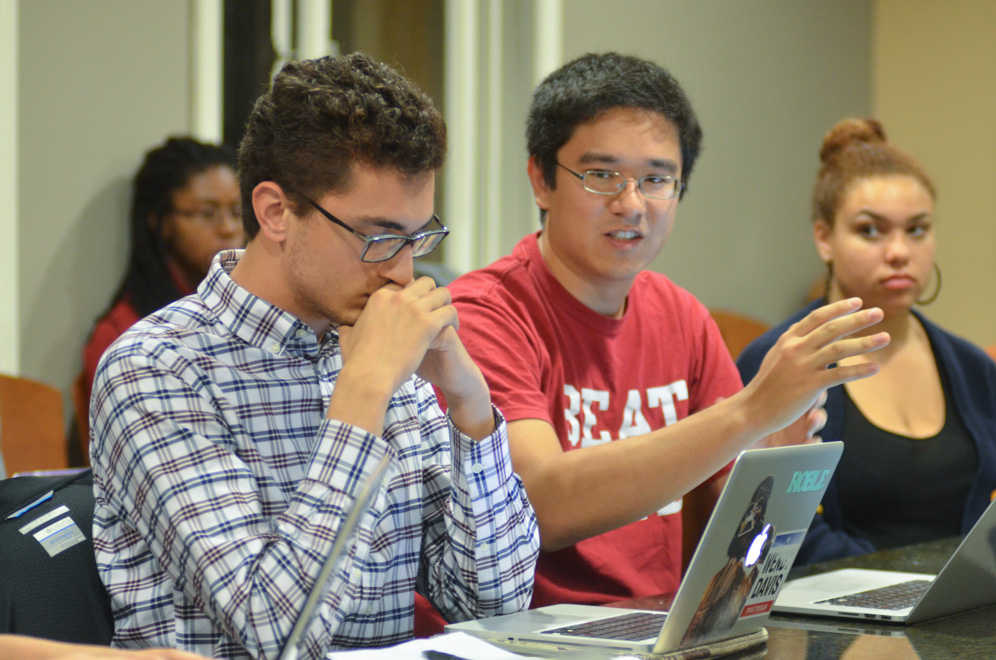
During the Oct. 28 meeting of the ASSU Undergraduate Senate, The Bill to Assign Reserve Accounts to Student Groups was extensively debated and ultimately ended with a veto by ASSU Executive Elizabeth Woodson ’15. As a response to this act, Ben Holston ’15, chair of the Undergraduate Senate, called a mandatory meeting on Nov. 1 to vote on a motion to override the veto.
“The ASSU Constitution presently states: If the total amount spent from a general or special fee is less than was allocated, then the financial manager shall transfer the remaining funds into a reserve account for that fee,” Holston said.
The financial manager may distribute funds from the reserve account of a group to that group upon authorization by the relevant Association legislative bodies. There are many systemic flaws with the current VSO funding system, such as the $1.3 million currently sitting in special fee reserve accounts.
The aforementioned sum is currently increasing, as Stanford has the highest student activities fee in the country. According to the bill, it would therefore be unacceptable to raise the general fee while operating within a flawed system without comprehensive funding reform.
During the discussion, senators debated the concept of student money being held up in reserves to be used at some vague point in the future.
“People aren’t investing in the future. They’re paying their student fees so that they can have student activities while they’re here,” said Senator Anthony Ghosn ’16.
Ghosn emphasized the necessity to stop considering the “logistical form of stupidity” that is the current funding system under a moral light.
“I think nobody could really convincingly argue that we’re spending the money we’re being given intelligently,” Ghosn said.
“What we really need to talk about is whether we’re willing to face the alternatives of not passing this,” said Senator John-Lancaster Finley ’16.
Holston described the situation as a “dilemma,” a situation in which neither of the options is desirable. He added that their job as senators is to do “what the right thing to do for the Stanford community is.”
“The current funding system, as it stands, will not give enough money to over 600 student groups because we don’t have enough money in the general fees,” Holston said. “Now this $1.3 million is money that I understand special fees groups would like to keep, but the reality of the situation is that general fees groups right now need this money desperately more than the special fees groups would be impacted and yet they would only be impacted if funding reform failed.”
Holston described the Senate as being “sick and tired” of waiting to take action.
“We have heard enough student groups,” he said. “We have seen enough student groups walk out of this Senate chamber like they walked out of here tonight without the money that they expected for their student groups because we refused to take action. I’m sick and tired of this Senate and this campus not taking action on a funding system that is fundamentally broken. Tonight we have the chance to do that … I think we wouldn’t be doing our jobs right if we didn’t take this opportunity and actually do something to help the student groups on campus that most need help.”
The bill was put to a vote and passed by a vote of 14 to 1. However, ASSU Executive Elizabeth Woodson ’15 vetoed the bill after the vote.
Woodson cited two reasons for her veto — the first, constitutional, and the second, “a matter of responsibility.”
“The constitutionality to me is a grossly loose interpretation of that document, to the point where I feel that it is irresponsible,” Woodson said. “The second is responsibility of our political, ethical and moral place in the University and as elected representatives. … We will continue to exist in many years to come. I feel that it is incredibly irresponsible for the sustainability of our financial existence for this bill to pass. I would encourage you to continue reaching out to the communities that you do represent and to think deeply about how you interpret elected office and to continue to work with [Stanford Student Enterprises] and the experts on this affair as well.”
After explaining her reasons, she left the room.
Holston described the use of the veto as “completely inappropriate.”
“A veto is a legislative tool that you use to negotiate and at no point did the executives approach us,” Holston explained. “I’m extremely disappointed.”
Additionally, he lamented the fact that the Executives “completely failed” at keeping their promise of providing the Bill to Appoint Students to University Committees and the Bill to Create ASSU Senate Equipment Rental System. Consequently, discussion surrounding these two bills was postponed.
In a subsequent email to The Daily, Woodson stated, “I respect each Senator and their intent with this bill very much. However, it is my responsibility to speak to the long-term sustainability of the ASSU financial system, which I understand to have been potentially jeopardized. Tonight and the meeting on Saturday will be good examples of the critical checks and balances system that our student government employs and for which I am grateful.”
The following discussion focused on a bill which would limit the amount of time a speaker may speak during the Senate meetings, as some meetings and their discussions have been considered “drawn-out and combative.”
However, the bill failed by a vote of 4 to 9.
The Senate then discussed a bill concerning a mandatory student mental health questionnaire, in order to find a way to allow students to discuss their mental health concerns without fear of being stigmatized by the peers. However, Rachel Samuels ’17, the Advocacy Committee Chair, felt that these sorts of discussions, even through a questionnaire, were very personal and potentially triggering for some people, and that they should not be forced to share that information.
“We should normalize the idea of going to see counselors and people to talk to,” she said. “The idea of having to go to an environment like that can be a trigger for some people.”
Another member of the audience added that “it could be incredibly invasive to compel people to go to Vaden” and discuss their mental health concerns. Nevertheless, the senators agreed that the information gathered would be valuable. However, no vote was given on this bill.
Contact Nikhita Obeegadoo at nix19 ‘at’ stanford.edu
